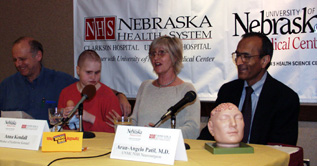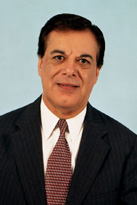A British family who traveled to Omaha with the hopes that a skilled neurosurgeon’s hands would help their daughter returned to England yesterday in high spirits.
 |
Nigel Kendall, left, with his daughter Katherine, his wife Anna, and Arun-Angelo Patil, M.D. |
On Sept. 1, Nigel and Anna Kendall of Surrey, England, brought their 18-year-old daughter, Katherine to Omaha to seek the help of the only surgeon in the world they knew of who might be able to help their daughter — Arun-Angelo Patil, M.D., UNMC/NHS neurosurgeon.
The Kendalls desperately searched around the world for something that might stop Katherine’s severe seizures that originated from both sides of the brain. They found only one neurosurgeon who would attempt the rare procedure their daughter needed — a multiple-subpial cortical transection (MST). Dr. Patil has performed the procedure on more than 50 children who experience extensive seizure foci.
The Kendalls, who live about 35 miles from London, had exhausted almost all hope of getting their daughter cured from the severe epileptic seizures that plagued their lives, until a London neurosurgeon mentioned Dr. Patil’s work. It was a glimmer of hope.
“Professor Polkey told us there was only one person in the world who could help Katherine,” Nigel Kendall said. “And that was Dr. Patil and his team in Omaha.”
Stopping severe seizures
Around the age of 8, Katherine began suffering from severe epileptic seizures. Ultimately, the seizures got so bad that her learning ability was affected. With a developmental age of 4 to 5 years old, she was confined by the constant seizure activity she suffered, exhausting her physically and mentally.
|
During Monday’s news conference, Nigel and Anna Kendall thanked Omahans for making them feel at home during their month-long stay.
“Dr. Patil notified our division that he had a patient and family in England that needed our services,” Mamdani said. “We met the Kendalls at the airport and provided for their on-going transportation needs. We have a host of volunteers who work with these families under one simple goal — to do whatever we can to give families and patients an opportunity to take their minds off the daily medical difficulties that brought them to Omaha. “We take them shopping and volunteers take families home for home-cooked meals,” Mamdani said. “It gets pretty old eating out every day and a friendly meal in the comfort of someone’s home means a great deal to families who may be thousands of miles away from their own loved ones.” Mamdani said the Kendalls are avid bird watchers, so his office arranged for several bird watching excursions. In the future, OIHS will provide financial support to bring a British neurosurgeon to Omaha to train with Dr. Patil on the multiple-subpial cortical transection, Mamdani said. The specialist will then return to England and provide such surgeries for other patients. Support for the educational exchanges comes from the Nancy Mamdani Cancer Care and Training Foundation — created to honor Mamdani’s wife and the care she received from NHS/UNMC specialists and staff during her final years of life. |
By the time Katherine came to Omaha, she had lost most of her speaking ability. They were looking forward to meeting with Dr. Patil.
Several days after they settled into the Lied Transplant Center, Dr. Patil performed two, 12-hour surgeries, five days apart on Katherine. He made about 1,000 cuts through circuits, or fibers, in the brain. The intended result was to essentially prevent the occurrence of seizures.
Neurosurgeons have several options for patients experiencing severe epileptic seizures. They can do conventional brain resection (removing part of the brain) or transection (cutting through the brain circuits causing the seizures).
Katherine required a procedure to stop seizures originating from both sides of her brain. Resection can be performed only on one side of the brain in limited areas, without the risk of paralysis, death and potential loss of speech. In addition, Katherine’s seizure activity covered such a large area in her brain, that resection, even on one side, would not have been effective in stopping her seizures, Dr. Patil said.
Transection was the answer. Athough other neurosurgeons perform transection on one side of the brain, the Kendalls found Dr. Patil the only one who would perform it on both sides of the brain, which was what Katherine needed.
“There’s an alternative operation we do here and that operation does not involve resection, it involves transection — just breaking the seizure circuits,” Dr Patil said. “It’s a long, tedious boring operation because you have to go every four millimeter and break the connection. Because we don’t resect, you don’t lose function.”
Dr. Patil said he doesn’t consider the procedure, developed years ago by a neurosurgeon in Chicago, particularly unique and doesn’t know why more neurosurgeons don’t do the procedure.
“All we know is it works,” Dr. Patil said. “If it works on the critical area, then rather than doing a resection …why not do it on both sides of the brain.”
Early results promising
Although, it will be one to two years before it is known if the surgery is completely successful (defined by an absence of seizures), Dr. Patil and the family are encouraged.
“Ideally, you want to wait a year or two before you can say the operation’s successful, however, we know that she had several bad seizures a day before the operation,” Dr. Patil said. “I think in the last four or five days at least, she has not had any seizures. There were a few flurries that she had from time to time but they were not serious after the operation and those have stopped.”
“We’re seeing good results early,” said Dr. Patil. “I think she will do very well.”
Of the 50-60 patients on whom Dr. Patil has done transections, about 55 percent are freed from seizures.
Katherine’s personality returns
The Kendalls already have noticed changes in Katherine. Before surgery, Katherine had blank expressions, was silent and rarely smiled; now she’s energetic, smiles a lot and is affectionate, something Anna and Nigel didn’t see before surgery.
“The most remarkable thing that’s happened since surgery is her personality,” Nigel Kendall said. “Before the surgery we had a child who just wasn’t tactile…didn’t like being kissed, didn’t like having someone sitting close to her on the sofa, and didn’t like being hugged. Now we’ve got a child who makes a fuss over you, she wants to kiss you, hug you. She has a completely different personality.”
When Katherine regained her speech following surgery, the first thing she said was, “I love you, mommy.”
“Day-by-day I can see skills coming back,” Anna Kendall said. “It’s a delight. This surgery was the only chance she had. Hopefully, it will give her a life worth living. It’s what we’ve been fighting for.”
The Kendalls say Katherine’s much more active, walks more steady and looks up instead of at her feet. Her appetite also has returned.
Leading the way for others
About 3,000 children in the United Kingdom live with the same kind of epilepsy as Katherine, the Kendalls said. They are hoping surgeons around the world will adopt the MST surgery to help similar families. “The path is open for others to follow,” Anna Kendall said.
“If Katherine is cured by this, we’re going to spread the word and say, ‘this is curable and that you need not be hopeless anymore.’ There is a light at the end of the tunnel,” Nigel Kendall said.
In England, Katherine will continue to attend a special school for rehabilitation in hopes that she ultimately will be able to resume living with her family fulltime.
 Some of those credited with making the Kendalls stay more enjoyable were volunteers and staff of Nizar Mamdani, executive director of the NHS/UNMC Office of International Healthcare Services (OIHS). The office brings foreign patients to Nebraska for highly specialized treatment at NHS/UNMC and fosters the exchange of staff for training, education and research.
Some of those credited with making the Kendalls stay more enjoyable were volunteers and staff of Nizar Mamdani, executive director of the NHS/UNMC Office of International Healthcare Services (OIHS). The office brings foreign patients to Nebraska for highly specialized treatment at NHS/UNMC and fosters the exchange of staff for training, education and research.